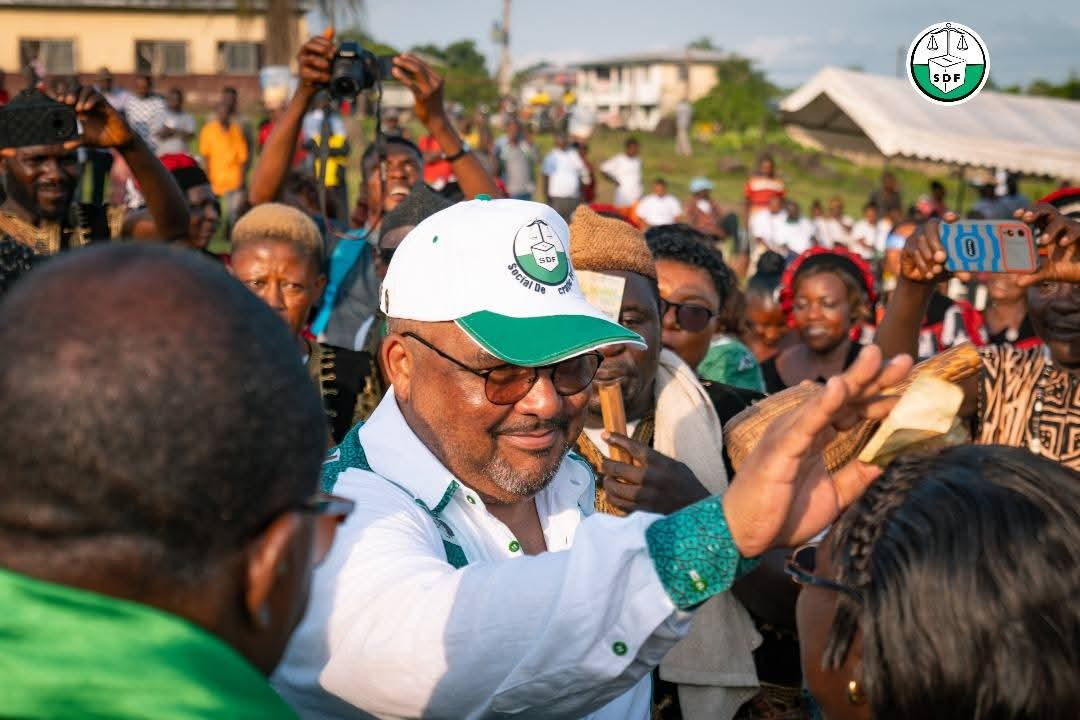By Andrew Nsoseka
As Cameroon approaches the pivotal presidential election on October 12, 2025, the Social Democratic Front, SDF, through its National Communication Secretary, Henry Kejang, has maintained that Joshua Osih, is a beacon of hope for Cameroon, as a nation yearning for change after over four decades of President Paul Biya’s rule.
“With a robust manifesto, deep grassroots support, and a proven commitment to democratic principles, Osih is the most credible candidate to lead Cameroon into a post-Biya era,” Kejang Henry emphatically declared.
“Joshua Osih is the best candidate for Cameroon. He has a realistic manifesto, something to lose, and is backed by grassroots support all over Cameroon, unlike many other candidates.”
Kejang says Osih’s agenda is built on a clear and actionable manifesto that addresses Cameroon’s most pressing challenges. During the SDF’s extraordinary convention on March 1, 2025, at the Yaounde Multipurpose Sports Complex, the party outlined a bold agenda for 2025-2026. Key promises include a 100-day plan to end violence in the Northwest and Southwest Regions, a one-year initiative to restore dignity to the Grand North’s population, and a three-year timeline for a constitutional referendum to strengthen democratic institutions.
To Kejang, “Osih’s manifesto is not just a list of promises; it’s a roadmap grounded in the realities of our country. He understands the socio-economic transformation Cameroon needs and has a clear plan to achieve it, unlike others who rely on vague slogans or divisive rhetoric.”
The SDF Communication Secretary says unlike many candidates who rely on regional or ethnic bases, Osih’s campaign, and the agenda of the SDF is bolstered by widespread grassroots support across Cameroon’s diverse regions.
“Joshua Osih has built a movement that transcends regional and linguistic divides. From the Centre to the Northwest, from the Southwest to the Grand North, his support comes from the people, not just political elites. This is a candidate with a real base, accountable to the voters who believe in him.”
Osih As The Candidate with Something to Lose
The SDF holds that in a political landscape rife with spoilers, candidates who masquerade as opposition figures but lack a genuine base or accountability, “Osih stands out for his established reputation and stakes in Cameroon’s future. As a successful businessman and Member of Parliament for Wouri, Osih has a tangible connection to the nation’s economic and political fabric…Osih has something to lose,” Kejang Henry noted.
“He’s not a fly-by-night candidate who can sell out without consequences. His career, his legacy, and his commitment to the SDF’s values tie him to the people’s aspirations.”
This contrasts sharply with other candidates who, according to analysts, lack the organisational infrastructure or public trust to safeguard votes or resist co-optation by the ruling Cameroon People’s Democratic Movement, CPDM. The CPDM’s history of infiltrating opposition ranks has made voters wary of candidates without a proven track record. “Spoilers are a real threat,” Kejang Henry warned.
“Some candidates have no base, no means to protect the vote, and no political consequences if they betray the opposition. Osih’s SDF has the structure and discipline to counter these tactics.”
Cameroon’s 2025 election is widely seen as a turning point, with President Biya’s advanced age signalling the end of an era. The opposition faces a critical challenge: uniting behind a candidate who can not only win but govern effectively in a post-Biya landscape. Osih’s candidacy ticks the essential boxes: national appeal, a reform-driven vision, independence from patronage, organisational strength, and a commitment to reconciliation.
“Osih is not just running to win; he’s running to rebuild,” said Kejang Henry. “His vision for a just, united, and federal Cameroon, as articulated at the SDF’s 35th anniversary in Buea, shows he’s ready to heal the wounds of conflict and marginalisation.”
Osih’s call for voter registration and mobilisation, particularly in conflict-scarred regions like the Northwest, underscores his focus on inclusive democracy.
While the idea of an opposition coalition has gained traction, Osih and the SDF advocate for a pragmatic approach that prioritises substance over symbolism.
Protecting vote integrity is a critical concern in Cameroon, where electoral institutions like ELECAM face accusations of bias. Osih’s campaign emphasises decentralised, resilient structures to monitor voter registration, campaigning, and vote counting.
“Osih’s campaign is defensible because it’s built on real organization, not just promises,” Kejang Henry asserted. “We have the structures to protect the vote and the resolve to resist sabotage.”
In contrast, spoilers lacking grassroots support or campaign infrastructure are vulnerable to manipulation, unable to ensure transparent vote counts or hold the ruling party accountable.
“These candidates can be bought or intimidated because they have no base to answer to,” Kejang Henry added. “Osih’s SDF is different—it’s a movement with a history of standing firm against the CPDM.”
“October 12, 2025, is not just an election; it’s a chance for renewal,” Kejang Henry concluded. “Joshua Osih is the best candidate for Cameroon because he represents hope, accountability, and a future where the people’s voice matters. With him, we can build a post-Biya era that delivers justice, inclusion, and progress.”

